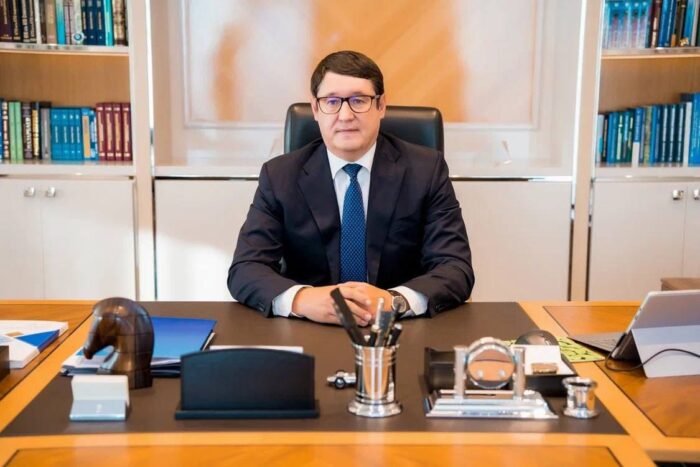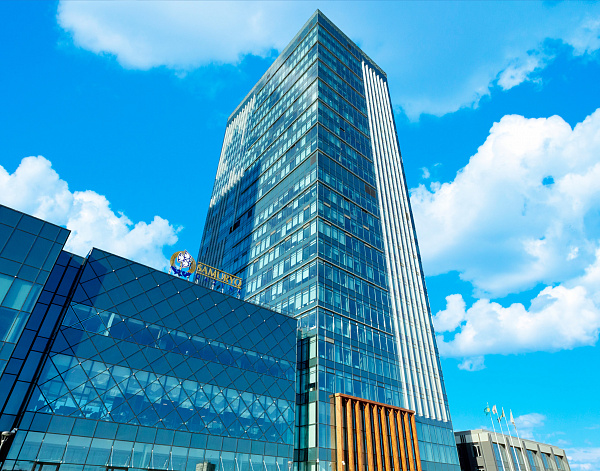NUR-SULTAN – Kazakhstan’s largest sovereign wealth fund Samruk Kazyna has been undergoing a major transformation this year amid the recently announced reforms on building a new state policy.

Almassadam Satkaliyev
The Samruk Kazyna is one of the biggest stakeholders of oil and gas, energy, national railroad, and postal office companies.
Implementation of reforms
President Kassym-Jomart Tokayev announced the need for a transformation of the Samruk Kazyna at the plenary session of the Mazhilis (a lower house of Parliament) on Jan. 11.
“To create long-term value for future generations we have defined key pillars of the fund’s development. The fund sees itself as a strategic holding for maintenance of social and infrastructure development of Kazakhstan in the next five-eight years. The fund will be gradually transformed to investment holding using the advanced business practices and the corporate management principles,” CEO of the Samruk Kazyna Fund Almassadam Satkaliyev recently told The Astana Times.
“We will focus on investments into the real sector within the country and development of infrastructure,” Satkaliyev explained. “The management of strategic assets is another key priority. It will be based on the principles of transparency and accountability. It is important for all portfolio companies, despite the IPO plans, to comply with the best corporate governance rules for the listed companies. Reduction of the carbon footprint and requirements for compliance with the ESG principles by all stakeholders will be our main priorities.”
The fund recently adopted new procurement procedures to remove bureaucratic barriers to businesses, ensure transparency, and minimize corruption risks. The new procurement procedures provide measures to support businesses, especially local manufacturers and small and medium enterprises.
Reducing the share of the fund in the country’s GDP will be done by implementation of the privatization program.
“At the end of the day, it is the people who are going to implement these reforms,” Satkaliyev said, touching upon the challenges of the reforms implemented. “Therefore, the main challenge is to make sure that all involved employees understand the reforms and are working towards its implementation. The fund has approved a detailed roadmap with key deliverables, owners and deadlines to execute the reforms.”

The main building of the fund in Nur-Sultan.
To increase transparency and accountability, the fund launched the Public council in 2021. As a platform, the council will immediately respond to the incoming constructive proposals. People can share their ideas, responses, offers and remarks on reforms of the fund via an online questionnaire.
On March 18, the meeting of the public council dedicated to the reduction of the fund’s share in the economy was held to discuss the strategy, approaches, and lists of the assets offered for privatization.
Representatives of stock exchanges (AIX, KASE), association of minority shareholders (QAMS), association of financiers, members of National council of public trust, investment bankers (Jusan, BCC, Halyk, Freedom Finance), public figures, and experts participated in the meeting.
“We received new and interesting offers. For example, we received an offer to promote the Employee Stock Ownership Program within the privatized companies, which will allow us to increase the number of retail clients and to unite management, shareholders and workers for achievement of common goals. In addition, it will be a reply to the request about equitable distribution of welfare among the population,” said Satkaliyev.
The Fund also cooperates with the Anti-Corruption Agency to implement the anti-corruption policy in the activities of the fund and its portfolio companies. As a result, the measures to automate and digitalize controls on compliance risk management in the business processes have been introduced.
“We pay attention to issues related to the prevention of corruption and ensuring that the activities of the fund group comply with the requirements of anti-corruption legislation,” he said.
Overview of the fund’s activities
The Samruk Kazyna group enjoyed positive results of key financial indicators in 2021 indicating the recovery of the fund’s business activities, which even exceeded the results of the pre-pandemic 2019. Net profit is expected to be around 1.6 trillion tenge (US$3.4 billion). The growth was facilitated mainly by the increase in prices of oil and oil products, which still have a significant share in revenues.
“We should also mention an improvement of indicators in other areas, such as air passenger transportation and rail freight transportation, which increased by 100 and 11 percent, respectively, compared to the last year,” said Satkaliyev. “This was largely due to the recovery of business activity and the relieving of quarantine measures after 2020. The demand for electricity is growing, which has a positive effect on the performance of our portfolio companies in this area, as evidenced by the preliminary results of financial statements. The growth in revenue from the sale and transportation of electricity amounted to 31 and 10 percent, respectively, compared to 2020.”
The fund’s activities may face risks in connection to the recent sanctions imposed on Russia. It includes logistical risks, extension of sanctions on some Russian banks that discourages the execution of mutual settlements with the Russian contractors in currency and risks related to the IPO.
“We are monitoring risks closely and have mitigation plans on hand to address the risks,” Satkaliyev said.
The fund is actively involved in charitable activities with a focus on regional social investment programs. In the period from 2016 to 2021, 265 social projects totaling 57.1 billion tenge (US$127 million) were implemented.
The total number of beneficiaries of charitable assistance during this period amounted to about more than 2 million persons from socially vulnerable groups.
